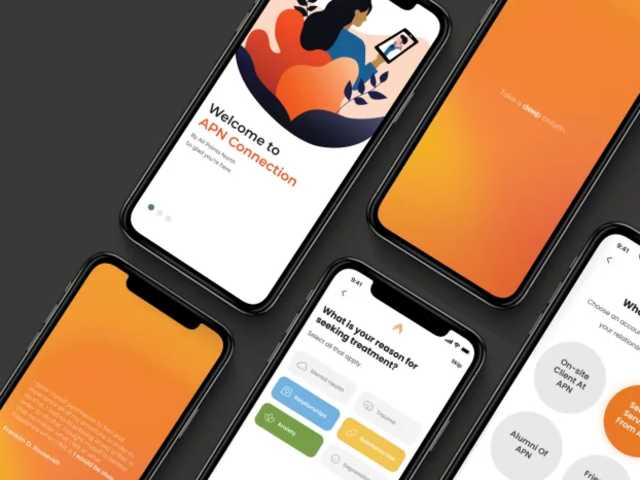Telehealth
APN Connection Virtual Therapy
Verified
Verified
This provider’s information has been quality-checked by Recovery.com’s Research Team for accuracy and completeness, including center verification through appropriate third-party organizations.
Joint Commission Accredited
The Joint Commission accreditation is a voluntary, objective process that evaluates and accredits healthcare organizations (like treatment centers) based on performance standards designed to improve quality and safety for patients. To be accredited means the treatment center has been found to meet the Commission's standards for quality and safety in patient care.
Provider's Policy
All Points North works with most insurance plans with Out of Network benefits. Our process includes free and confidential insurance verification to determine if there are benefits which can be applied towards your care.
Estimated Cash Pay Rate
The cost listed here (Varies; Based On Program) is an estimate of the cash pay price. Center pricing can vary based on program and length of stay. Contact the center for more information. Recovery.com strives for price transparency so you can make an informed decision.
About APN Connection Virtual Therapy
APN Connection takes All Points North’s renowned treatment services online. Individual and group therapy offer support for clients coming out of residential addiction treatment, clients with trauma, and anyone else looking to maintain their mental health. Specific groups and programs cater to different populations. In all program options, clients receive professional treatment in a user-friendly and convenient way, making therapy and mental health care possible for many.
Expert Care Delivered Online
APN’s robust telehealth team customizes treatment for each client. As clients progress, they can move to different levels of treatment, like intensive outpatient (IOP) to outpatient. This model reflects APN’s continuum of care priority, giving clients ongoing support for as long as they need it. Working 1-on-1 with their therapist, clients can explore topics of their choosing. Group therapies connect clients all over the world.
Specialized Care Programs
In APN Connection’s 8-week IOP program, clients meet for 10 hours a week. Intensive outpatient programs help clients with trauma, those in recovery, and athletes struggling with their mental health and/or substance use. Support groups meet during the week to enhance recovery and mental wellness. Families can also participate with online therapy and 8 weeks of family therapy post treatment.
Convenience And Connection
Clients using APN Connection can join from anywhere. The benefits of telehealth also extend to many, like those in recovery and those with primary mental health conditions or trauma. APN uses a variety of therapy approaches in their virtual program, including dialectical behavior therapy (DBT) and mindfulness. Evidence-based and holistic care help give everyone the comprehensive care they need.
Read More
Insurance Accepted
Provider's Policy:All Points North works with most insurance plans with Out of Network benefits. Our process includes free and confidential insurance verification to determine if there are benefits which can be applied towards your care.
Convenient Recovery Resources
APN Connection meets the needs of clients with busy schedules, providing their same quality care in a virtual setting. Clients can flex treatment to their schedule, working with APN Connection’s director to find something that works for them. Their virtual setting also allows clients who have transportation challenges to get the care they need.
Virtual Family Programming
Families and couples can also meet online for therapy. APN’s family therapy program helps connect families and couples, allowing them to become advocates for the recovery and wellness of their loved one. Education on addiction and mental health strengthens the family support system, for clients and their families.
Custom Step-Down Care
APN Connection uses a step-down process to continue treatment at various care levels. As clients work through their care, they can start growing confidence in their recovery and in their ability to manage stressors and triggers without intensive care. Coping tools help clients with their mental health too, whether it co-occurs with addiction or separately.
Grow in Knowledge And Support
Process and support groups allow for multiple areas of growth, helpful for clients and those around them. APN Connection offers a variety of specific groups, like an LGBTQIA+ support group, a professionals group, a LivingSober process group, a chronic pain support group, and many more.

Center Overview
Estimated Cash Pay Rate
Older Adults
Addiction and mental health treatment caters to adults 55+ and the age-specific challenges that can come with recovery, wellness, and overall happiness.
Executives
Executive treatment programs typically directly support the needs of people who manage businesses and may provide flexible schedules and office space to allow work during treatment.
Young Adults
Emerging adults ages 18-25 receive treatment catered to the unique challenges of early adulthood, like college, risky behaviors, and vocational struggles.
LGBTQ+
Addiction and mental illnesses in the LGBTQ+ community must be treated with an affirming, safe, and relevant approach, which many centers provide.
Men and Women
Men and women attend treatment for addiction in a co-ed setting, going to therapy groups together to share experiences, struggles, and successes.
Midlife Adults
For adults ages 40+, treatment shifts to focus on the unique challenges, blocks, and risk factors of their age group, and unites peers in a similar community.
Pregnant Women
Addiction and mental health treatment meets the clinical and psychological needs of pregnant women, ensuring they receive optimal care in all areas.
Professionals
Busy, high-ranking professionals get the personalized treatment they need with greater accommodations for work, privacy, and outside communication.
Veterans
Patients who completed active military duty receive specialized treatment focused on trauma, grief, loss, and finding a new work-life balance.

Treatment Focus
You can admit to this center with a primary substance use disorder or a primary mental health condition. You'll receive support each step of the way and individualized care catered to your unique situation and diagnosis.

Care Options








Treatment
Specializations
Anxiety
Anxiety is a common mental health condition that can include excessive worry, panic attacks, physical tension, and increased blood pressure.
Burnout
Burnout entails mental and physical exhaustion, and leads to a severe lack of fulfillment. This condition is often caused by overwork.
Drug Addiction
Drug addiction is the excessive and repetitive use of substances, despite harmful consequences to a person's life, health, and relationships.
Family Therapy
Family therapy addresses group dynamics within a family system, with a focus on improving communication and interrupting unhealthy relationship patterns.
Professionals
Busy, high-ranking professionals get the personalized treatment they need with greater accommodations for work, privacy, and outside communication.
Approaches
Evidence-Based
A combination of scientifically rooted therapies and treatments make up evidence-based care, defined by their measured and proven results.
Family Involvement
Providers involve family in the treatment of their loved one through family therapy, visits, or both–because addiction is a family disease.
Personalized Treatment
The specific needs, histories, and conditions of individual patients receive personalized, highly relevant care throughout their recovery journey.
Therapies
1-on-1 Counseling
Patient and therapist meet 1-on-1 to work through difficult emotions and behavioral challenges in a personal, private setting.
Trauma-Specific Therapy
This form of talk therapy addresses any childhood trauma at the root of a patient's current diagnosis.
Mindfulness Therapy
This ancient practice can be mental, emotional, and even spiritual. In meditation, you focus your attention on the present moment without judgement.
Family Therapy
Family therapy addresses group dynamics within a family system, with a focus on improving communication and interrupting unhealthy relationship patterns.
Stress Management
Patients learn specific stress management techniques, like breathing exercises and how to safely anticipate triggers.
Acceptance and Commitment Therapy (ACT)
This cognitive behavioral therapy teaches patients to accept challenging feelings and make the appropriate changes to reach personal goals.
Conditions We Treat
Anxiety
Anxiety is a common mental health condition that can include excessive worry, panic attacks, physical tension, and increased blood pressure.
Burnout
Burnout entails mental and physical exhaustion, and leads to a severe lack of fulfillment. This condition is often caused by overwork.
Depression
Symptoms of depression may include fatigue, a sense of numbness, and loss of interest in activities. This condition can range from mild to severe.
Post Traumatic Stress Disorder
PTSD is a long-term mental health issue caused by a disturbing event or events. Symptoms include anxiety, dissociation, flashbacks, and intrusive thoughts.
Stress
Stress is a natural reaction to challenges, and it can even help you adapt. However, chronic stress can cause physical and mental health issues.
Trauma
Some traumatic events are so disturbing that they cause long-term mental health problems. Those ongoing issues can also be referred to as "trauma."
Substances We Treat
Alcohol
Using alcohol as a coping mechanism, or drinking excessively throughout the week, signals an alcohol use disorder.
Benzodiazepines
Benzodiazepines are prescribed to treat anxiety and sleep issues. They are highly habit forming, and their abuse can cause mood changes and poor judgement.
Co-Occurring Disorders
A person with multiple mental health diagnoses, such as addiction and depression, has co-occurring disorders also called dual diagnosis.
Cocaine
Cocaine is a stimulant with euphoric effects. Agitation, muscle ticks, psychosis, and heart issues are common symptoms of cocaine abuse.
Drug Addiction
Drug addiction is the excessive and repetitive use of substances, despite harmful consequences to a person's life, health, and relationships.
Heroin
Heroin is a highly addictive and illegal opioid. It can cause insomnia, collapsed veins, heart issues, and additional mental health issues.
Opioids
Opioids produce pain-relief and euphoria, which can lead to addiction. This class of drugs includes prescribed medication and the illegal drug heroin.
Prescription Drugs
It's possible to abuse any drug, even prescribed ones. If you crave a medication, or regularly take it more than directed, you may have an addiction.
Experience
Special Considerations
Executive Program
Addiction and mental health treatment for executives typically involves high discretion, greater technology access, and more private, 1-on-1 care.
Professional Staff

Lisa Orraca
Telehealth Clinical Director
LMFT, MA

Karri Francisco
Director of Family Programming
LMFT

Annie Mell
Senior Clinical Case Manager
MA, LPC, ATR-BC, MBA HA

Arlene Story
Telehealth Therapist
MS, LMHC, LCAC, TEP, CSAT-S, CTT
View More Team Members
We love hearing about your treatment experience
Help individuals and families seeking treatment by sharing your first-hand experience with this treatment provider. Review Guidelines.




























